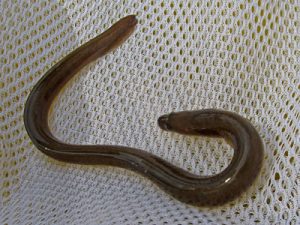
The Maryland Department of the Environment (MDE) and Maryland Department of Natural Resources (DNR) recently announced that in 2021, more than half a million eels have been captured below the Conowingo Dam. The captured eels will be transported upstream and released in the Susquehanna River.
American eels carry baby mussels that cleanse the water and improve ecosystem health. Building on this success, an agreement between the Maryland Department of the Environment and Exelon, owner of the dam, will require the company to make investments to further increase these numbers.
As of August 31, 2021, 537,182 American eels have been captured at the Conowingo Dam for transport upstream in 2021. This marks the third straight year of increasing eel numbers at the dam. The previous record of eels captured was 293,141 eels in 2013, which was surpassed in August 2021.
American eels play an important role in keeping water clean in aquatic ecosystems, including the Susquehanna River and the Chesapeake Bay. They serve as a primary host fish required for freshwater mussels to reproduce.
Larval mussels attach to the gills of eels and other fish and receive a ride upstream, where they drop and burrow into the substrate to spend their lives filtering material from the water. Dispersal of the mussels is dependent on the movement of the host fish. The mussels, in turn, help improve water quality by retaining, removing, and recycling nutrients and sediment before it enters the Chesapeake Bay. Each mussel filters more than 10 gallons of water per day.
It is not known why numbers of eels have increased in recent years at the Conowingo Dam, but scientists expect the higher numbers of American eels and other fish species to increase abundance of freshwater mussels filtering the tributaries of Chesapeake Bay and improving its water quality.
Migrating, young American eels (Anguilla rostrata) have been captured and transported upstream annually from Conowingo Dam since 2007 under an operation made possible through the U.S. Fish and Wildlife Service, the Maryland Department of Natural Resources and Exelon.
As a result of the 2020 settlement agreement between MDE and Exelon, Exelon will also be adding a second ramp on the east side of the Conowingo Dam, catching even more eels for placement upstream. In addition to requiring Exelon to help restore American eels to the Bay ecosystem, the Conowingo settlement requires Exelon to provide more than $25 million to create and sustain a large-scale mussel restoration effort in the Susquehanna River throughout the next 50 years.
Plans are underway to expand the Maryland Department of Natural Resources’ Joseph Manning Hatchery in Brandywine to include a large-scale freshwater mussel hatchery. That hatchery will provide baby mussels placed in the Susquehanna River to further advance the return of this species to the Bay ecosystem to help meet clean water goals.
sources: Maryland Department of the Environment, Maryland Department of Natural Resources
Leave a Reply
You must be logged in to post a comment.